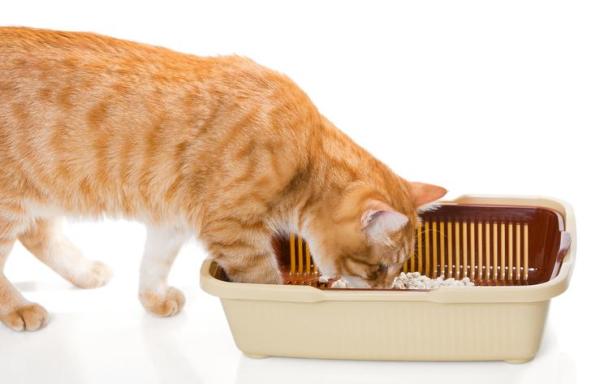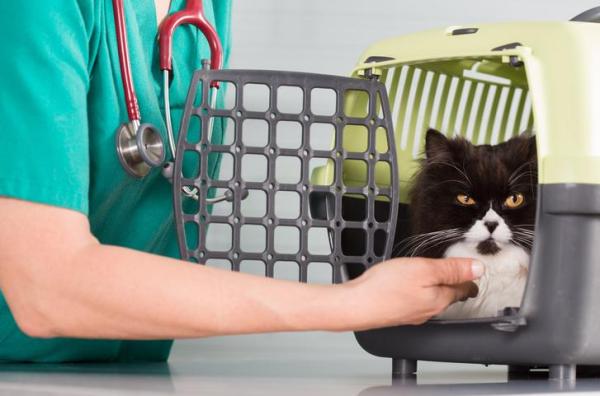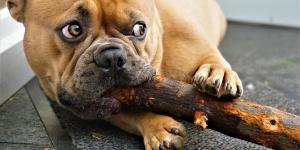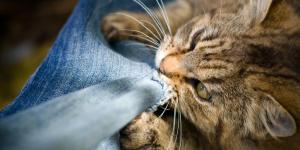Cats Eating Dirt - Signs of Pica in Cats



See files for Cats
If you have tried to change your cat's food, you may have noticed they have quite a select palate. Their diet is essential to maintain their health and well-being. Any changes to it can put their security in jeopardy. This is why cat guardians can often be alarmed when they see changes in the dietary habits of their feline. In this context, a relatively infrequent, but characteristically odd, behavior in cats is eating dirt. We might even see a cat eating its own litter.
If you want to know more about cats eating dirt, AnimalWised brings you all the background you need to know. We discuss the main reasons why a cat eats dirt and the ways we can best avoid it. In doing so, we highlight a particular cause of this behavior which can eventually develop into a serious health problem.
Is it normal for a cat to eat dirt?
Although we may tolerate some seemingly odd behavior in our pets, cats eating dirt is not one of them. It is not normal, it is not acceptable and, importantly, it is not harmless. This anomalous behavior indicates that their well-being is compromised. Furthermore, if we do not act quickly, it can lead to serious health problems.
By eating dirt, your cat might also be ingesting excrement, toxic substances, bacteria, parasites and any other nasty material which shouldn't be eaten. This means the dirt can become a means of contagion for many of the common diseases in cats. This is particularly the case if you see cats eating litter from their litter box. Eating the material onto which cats urinate and defecate can be very dangerous.
In addition to bacteria and other infectious materials, the consumption of foreign bodies can provide practical problems. The indigestible material can irritate and inflame the gastrointestinal system, particularly mucosa in the intestine. The resulting inflammation is known as enteritis, although stomach inflammation (gastritis) can also occur. If inflammation occurs, it can lead to severe blockages which are severely life threatening. If there are sharp objects such as stones in the dirt, intestinal perforation can occur. Internal hemorrhages can be fatal.
Why do cats eat dirt? What reason could lead to them eating litter? There is no single reason for this behavior in cats. To identify the reasons for your cat eating dirt, we need to look at the greater context. Pay special attention to any changes in their routine, nutrition, health or day-to-day behavior.
Considering all the possible risks of your cat ingesting dirt, we recommend you go to the veterinarian. If they are carrying out odd behavior, there may be various factors involved. Only a qualified vet will be able to determine an accurate diagnosis. Below we detail some of the causes which may lead to such a diagnosis.
5 reasons why cats eat dirt
While there are many reasons behind the behavior of cats eating dirt, there are some main factors we can look at. Here are the five main reason why a cat eats dirt to help us answer our questions:
- Pica Syndrome: this health problem is characterized by the ingestion of inedible material with no nutritional value. Although it does occur, it is more common in dogs than cats. The cat may begin to consume material such as plastic, wood, stones or, in this case, dirt.
- Stress, boredom or anxiety: cats need to have their body and mind well stimulated to maintain balanced behavior. If your cat does not have an enriched environment, does not do enough exercise or have ways to express their intelligence and curiosity, they will likely develop stress or boredom. The habit of eating dirt may be a behavioral change which indicates the accumulation of stress and/or anxiety.
- Demand for attention: although cats are often characterized as being aloof or even solitary, they are more sociable than they are given credit for. They develop a strong bond with their guardians and company is essential for a happy and healthy life. If you have recently been very busy, you may not have been able to dedicate enough time to play and bond. If your cat wants your attention, they may engage abnormal behavior, eating dirt being one of them.
- Intestinal parasites: it has been demonstrated that certain animals in the wild consume grass and other foods to purge themselves of an intestinal parasite infestation. This is one of the reasons it is essential we visit the vet to rule out this cause.
- Kittens eating dirt: lastly, it is important to point out why kittens eat dirt. As they are starting to discover their environment, they may test the water by trying to eat certain objects such as dirt. However, they should learn fairly quickly this does them no good. If you see a kitten eating dirt, it can be particularly worrying thanks to their vulnerable state.

Symptoms of a cat eating dirt
Many tutors will be unable to spend all day with their cat. For this reason, the cat may be eating dirt without us noticing. One of the most common signs is that, since the dirt is indigestible, it appears in the cat's feces. If the cat is eating litter, then we need to be careful to notice the difference between litter which is in the box and that which has been digested.
In cases where the cat is suffering from pica (the chronic ingestion of inedible material), then we need to look out for certain symptoms. In cases where cats ingest a large amount of dirt, earth, stones or other foreign bodies, they may present the following symptoms:
- Recurrent gagging and vomiting.
- Constipation or difficulty to defecate (the accumulation of dirt, sand or stones can generate an obstruction in the intestinal tract, preventing the feline from defecating normally).
- Presence of blood in the stool (may result from obstruction or the consumption of stones and sharp objects).
- Symptoms common to gastritis in cats, such as vomiting, loss of appetite, weight loss, diarrhea, dehydration, lethargy, excessive drooling, etc.
- Weakness and lack of interest in their daily activities.
Pica in cats
While we have detailed some common causes of cats eating dirt, we want to highlight pica as a particularly dangerous issue. Pica is a disorder which can also be found in humans. It often leads to similar serious problems as the inedible material becomes lodged in the gastrointestinal tract. With humans, however, we can discuss with patients the reasons behind this behavior. It is often something which is linked closely with mental health issues.
For cats, determining mental health problems are even more difficult. There have been observations of dogs eating non-nutritive objects linked to being crated for too long[1]. However, there is little similar medical evidence to support the same conclusions in cats. We may presume that stress behaviors might be at fault, but a report from 2015 reports that “the ingestion of inedible items... does not seem to be the consequence of a suboptimal environment or early weaning”[2]. This does not mean that suboptimal environment or being taken away from their mother too early do not cause problems, it is just unclear whether pica is one of them.
It has been posited that nutritional deficiencies may be linked to pica in cats. The publication Emergency Procedures for the Small Animal Veterinarian claims that pica in cats may be related to immune-mediated hemolytic anemia[3]. This iron deficiency may help explain why a cat might eat metal objects or eve lick the ground. They may be trying to find minerals of which they are lacking.
Genetics may also play a part in this behavior. ‘Oriental’ breeds such as the Siamese cat are known to engage in this practice more than others. The most common material ingested by cats in a study from 1997 was wool[4]. Unfortunately there is little consensus as to the exact cause of pica in cats. What is generally agreed upon is that it is dangerous behavior and should be stopped.

What to do if your cat is eating dirt
As we state, cats eating dirt is not good for them as an organism. It is important to consider that this behavior might also be linked to a secondary disease, illness or behavioral issue. Lack of appropriate nutrition is one such issue which can manifest itself in various ways. This is why choosing alternative diets such as the BARF diet need to be done carefully and under a veterinarian's supervision.
We also stress how important it is to take your cat to the vet if you have evidence they are eating dirt routinely. After ruling out possible pathological causes, it will be important to pay special attention to the cat's diet, environment and routine to treat and prevent this type of behavior. In this regard, we provide you some basic guidelines to prevent your cat from eating dirt or any other foreign bodies which can cause them harm:
- Diet: you must provide a complete and balanced diet which meets all of the cat's nutritional needs. This diet also needs to be adapted to the individual and the various factors which affect their dietary requirements. This included the cat's age, health status and other factors. You may be able to provide the cat with homemade food, but you need to ensure it is nutritionally correct.
- Well-being: it is fundamental for a cat's mental well-being for them to live in an enriched environment so the cat has positive ways to release energy, stimulate their mind and have fun. This is especially so when you are not at home.
- Games and socialization: it is essential to reserve time in each day to interact with your cat. The best thing you can do is to play intelligence games and engage in fun activities. Simply spending time and petting them is also important to keep them happy and strengthen your bond together.
- Hygiene: maintaining optimal hygiene is also very important in reducing behaviors such as eating dirt. if the dirt eating is indeed related to a parasitical infestation, then keeping them clean will best avoid this happening in the first place. Cats are also very clean animals, so any lack of hygiene can cause them a great deal of stress.
- Preventive medicine: we also need to do all we can to reduce the risk of certain diseases. Closely follow the cat's vaccination and deworming schedules to maintain good health. Similarly, a vet visit every 6 to 12 months is the best way to highlight possible issues and deal with them in a prompt manner.

If you want to read similar articles to Cats Eating Dirt - Signs of Pica in Cats, we recommend you visit our Behavioral problems category.








